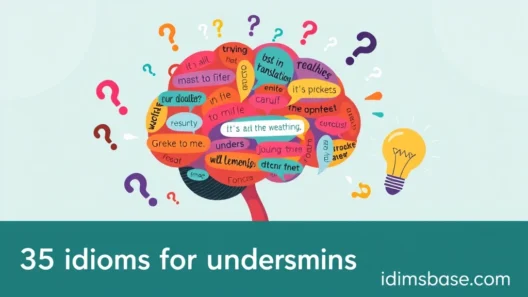Have you ever found yourself in a situation where the clock just seemed to melt away, and suddenly, hours had passed without anything truly productive getting done? We've all been there! It's a universal experience, this curious phenomenon of time slipping through our fingers. Sometimes, it's intentional, a much-needed break. Other times, it’s an accidental detour into the land of procrastination. But no matter the reason, the English language, in its wonderfully expressive way, has a treasure trove of idioms to describe exactly this – the art, or perhaps the unfortunate habit, of wasting time.
Idioms are fascinating, aren't they? They're like little linguistic puzzles, painting vivid pictures with words that often don't make literal sense but convey a powerful meaning. Understanding these expressions not only enriches your vocabulary but also helps you grasp the nuances of everyday conversations. So, if you're ready to dive into the colorful world of English idioms and explore the many ways we talk about time that isn't spent wisely, you're in for a treat! Let's explore 35 fantastic idioms that perfectly capture the essence of wasting time.
35 Idioms for Wasting Time
Let's explore some of the most common, quirky, and downright brilliant idioms for wasting time. You'll be surprised how many of these you might already use, and how many new ones you'll want to add to your linguistic toolkit!
Common Expressions of Wasted Time
- Kill time: This one is super popular! It means to do something that isn't important simply to pass the time while waiting for something else to happen.
- Example: "I had an hour to kill before my flight, so I browsed the shops."
- Twiddle your thumbs: Imagine someone sitting idly, rotating their thumbs around each other. That's exactly what this means – to do nothing useful while waiting.
- Example: "We were twiddling our thumbs for hours, waiting for the doctor to call us in."
- Fritter away time/money: This idiom implies spending time or money foolishly, on unimportant things.
- Example: "He frittered away his entire afternoon playing video games instead of studying."
- Whittle away time: Similar to fritter away, this suggests gradually reducing or diminishing time, often by doing small, unproductive tasks.
- Example: "She whittled away the morning on social media."
- Let time slip through your fingers: This vivid image perfectly describes losing control over how you spend your time, often unintentionally.
- Example: "I promised myself I'd finish that report, but I just let the time slip through my fingers."
- Idle away the hours/days: To spend time doing nothing productive, often in a relaxed, carefree manner.
- Example: "On vacation, we just idled away the days by the pool."
- Waste time: The most straightforward one of all! To use time in a way that is not productive or doesn't achieve anything useful.
- Example: "Don't waste time arguing; let's find a solution."
- Spend time: While "spend time" can be neutral, when used in context of unproductive activities, it implies wasting it.
- Example: "He spent too much time worrying about things he couldn't change."
Idioms Related to Doing Nothing Productive
- Mark time: To remain in the same position, making no progress, often while waiting for further instructions or developments.
- Example: "The project is just marking time until we get the necessary approvals."
- Spin your wheels: This refers to putting in effort but making no progress, like a car stuck in mud.
- Example: "I feel like I'm just spinning my wheels on this task; I'm not getting anywhere."
- Go nowhere fast: To be engaged in an activity that involves a lot of effort or movement but doesn't lead to any significant progress.
- Example: "We've been discussing this for an hour, but we're going nowhere fast."
- Run around in circles: To be very busy but without achieving anything useful, often repeating the same actions.
- Example: "I've been running around in circles all morning trying to fix this printer."
- Chase your tail: Similar to running around in circles, this means to be busy doing things that are ultimately pointless or unproductive.
- Example: "He's been chasing his tail all day, trying to sort out that minor issue."
- Beat around the bush: To avoid coming to the point; to talk about unimportant things instead of the main topic. This wastes time in a conversation.
- Example: "Stop beating around the bush and just tell me what you want."
- Drag your feet: To act slowly or reluctantly, often delaying something that needs to be done.
- Example: "The committee is dragging their feet on making a decision."
- Waste your breath: To spend time talking when it's clear the person you're speaking to won't listen or be persuaded.
- Example: "Don't waste your breath trying to convince him; he's already made up his mind."
Playful and Evocative Idioms

- Dilly-dally: To waste time, especially by being slow, indecisive, or by doing unimportant things. It sounds a bit whimsical, doesn't it?
- Example: "Stop dilly-dallying and get dressed; we're going to be late!"
- Dawdle: To move or act slowly, often wasting time.
- Example: "Please don't dawdle; we need to leave soon."
- Fool around/about: To behave in a silly or playful way, often when you should be serious or working.
- Example: "Stop fooling around and pay attention in class!"
- Goof off: To waste time or avoid doing work. This one is very informal.
- Example: "The students were goofing off instead of studying for the exam."
- Lounge around: To spend time relaxing and doing very little, often in a lazy way.
- Example: "On Sundays, I love to just lounge around the house."
- Piddle around/about: To waste time doing small, unimportant things.
- Example: "He spent the whole afternoon piddling around in the garage."
- Potter around/about: Similar to piddle around, this means to do small, unimportant tasks in a relaxed way, often without a specific goal.
- Example: "She was just pottering around the garden, trimming a few plants."
- Bum around: To spend time doing nothing in particular, often in a lazy or aimless way. Very informal.
- Example: "After graduation, he just bummed around for a few months."
- Sit on your hands: To do nothing when action is needed or expected.
- Example: "We can't just sit on our hands while the problem gets worse."
- Let the grass grow under your feet: To be slow in taking action or to delay doing something important.
- Example: "Don't let the grass grow under your feet; seize the opportunity!"
- Paint the lily/gild the lily: To try to improve something that is already perfect or beautiful, often making it worse or wasting effort.
- Example: "Adding more features to this already excellent product would be like painting the lily."
Idioms About Procrastination and Delay
- Put off: To delay doing something until a later time. A classic form of wasting time!
- Example: "Don't put off until tomorrow what you can do today."
- Procrastinate: To delay or postpone action; to habitually put off doing things.
- Example: "I tend to procrastinate when faced with a difficult task."
- Drag out: To make something last longer than necessary.
- Example: "The meeting dragged out for over three hours."
- Stall for time: To deliberately delay an action or decision in order to gain more time.
- Example: "He was stalling for time, hoping someone else would come up with a solution."
- Waste away: To gradually decline in health or strength, often due to lack of activity or purpose. While not strictly about time, it implies a life not lived fully.
- Example: "He was wasting away in his old age, with nothing to do."
- Cool your heels: To wait for a period of time, often impatiently.
- Example: "You'll have to cool your heels in the waiting room for a while."
- Piss away (time/money): A very informal and somewhat vulgar way to say to waste time or money carelessly.
- Example: "He just pissed away his inheritance on silly things."
- Wile away the hours/time: To spend time in a relaxed, often aimless way, especially when waiting for something. It has a slightly more positive or neutral connotation than "waste time," implying enjoyment.
- Example: "We wiled away the hours playing cards on the porch."
Key Takeaways
Understanding idioms is a fantastic way to deepen your grasp of a language and its cultural nuances. When it comes to "wasting time," English offers a rich tapestry of expressions, each with its own flavor and context.
- Variety is the Spice of Life (and Language!): From the direct "waste time" to the whimsical "dilly-dally" or the frustrated "spin your wheels," there's an idiom for every shade of unproductive activity.
- Context is King: Many of these idioms, like "spend time" or "wile away," can be neutral or even positive depending on the context. It's the surrounding words and situation that often reveal their "wasting time" meaning.
- Enhance Your Communication: Using these idioms will make your English sound more natural, sophisticated, and engaging. You'll be able to express yourself with greater precision and color.
- Recognize the Signs: Knowing these idioms can also help you identify when you, or others, might be falling into the trap of unproductive habits!
So, the next time you find yourself "twiddling your thumbs" or feel like you're "running around in circles," you'll have the perfect idiom to describe it!
Frequently Asked Questions (FAQ)

What is an idiom?
An idiom is a phrase or expression whose meaning cannot be understood from the ordinary meaning of its individual words. It's a figurative expression, where the words together create a meaning distinct from their literal interpretation. For example, "kick the bucket" means to die, not literally to kick a bucket.
Why is it important to learn idioms?
Learning idioms is crucial for several reasons! Firstly, they are very common in everyday conversation, literature, and media, so understanding them helps you comprehend native speakers and various forms of English content. Secondly, using idioms makes your language sound more natural, fluent, and sophisticated, allowing you to express yourself more effectively and colorfully. Finally, idioms often reflect cultural values and ways of thinking, offering deeper insights into the language's background.
Are these idioms formal or informal?
The formality of these idioms varies! Some, like "waste time" or "put off," are quite neutral and can be used in almost any context. Others, such as "goof off," "bum around," or "piss away," are highly informal and best suited for casual conversations with friends. Idioms like "beat around the bush" or "drag your feet" are generally accepted in most informal to semi-formal settings. When in doubt, it's always safer to stick to the more neutral options in formal situations.
Can I use these idioms in writing?
Absolutely! These idioms can enhance your writing, especially in creative pieces, informal emails, blog posts, or dialogue. They add flavor and personality to your text. However, just like with spoken language, be mindful of the context and your audience. In very formal academic papers or business reports, it's often better to use more direct and literal language.
How can I practice using these idioms?
The best way to practice is to actively try incorporating them into your conversations and writing! Here are some tips:
- Listen Actively: Pay attention to how native speakers use these idioms in movies, TV shows, podcasts, or real-life conversations.
- Create Sentences: For each new idiom, try to write a few sentences using it in different contexts.
- Flashcards: Make flashcards with the idiom on one side and its meaning and an example sentence on the other.
- Speak Up: Don't be afraid to try using them in your daily conversations. The more you use them, the more natural they'll feel.
- Keep a Journal: Write down new idioms you learn and try to use them in your journal entries.
What's the difference between "kill time" and "waste time"?
While both involve time not being used productively, there's a subtle but important difference:
- Kill time: This often implies an intentional act of doing something unimportant because you have nothing better to do while waiting. There's usually no negative connotation; it's just passing the time.
- Example: "I had to kill time at the airport, so I read a book." (Neutral, planned)
- Waste time: This usually implies an unintentional or unwise use of time, often with a negative connotation. You might feel regret or realize you could have used the time more effectively.
- Example: "I wasted so much time binge-watching that show instead of working on my project." (Negative, regretful)
Are there any idioms that mean the opposite of wasting time?
Yes, there are! Here are a few:
- Make the most of your time: To use your time effectively and fully.
- Seize the day (Carpe Diem): To make the most of the present opportunity without worrying about the future.
- Make every minute count: To use every moment productively and purposefully.
- Redeem the time: To make good use of time, especially after a period of wasting it.
- Time well spent: To describe an activity that was productive, enjoyable, or beneficial.







